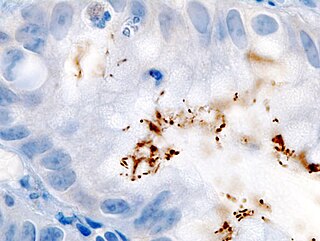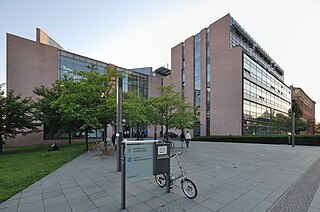
Helicobacter pylori, previously known as Campylobacter pylori, is a gram-negative, microaerophilic, spiral (helical) bacterium usually found in the stomach. Its helical shape is thought to have evolved in order to penetrate the mucoid lining of the stomach and thereby establish infection. The bacterium was first identified in 1982 by Australian doctors Barry Marshall and Robin Warren. H. pylori has been associated with lymphomas of the mucosa-associated lymphoid tissue in the stomach, esophagus, colon, rectum, or tissues around the eye, and of lymphoid tissue in the stomach.
In biology, immunity is the capability of multicellular organisms to resist harmful microorganisms. Immunity involves both specific and nonspecific components. The nonspecific components act as barriers or eliminators of a wide range of pathogens irrespective of their antigenic make-up. Other components of the immune system adapt themselves to each new disease encountered and can generate pathogen-specific immunity.

Barry James Marshall is an Australian physician, Nobel Prize Laureate in Physiology or Medicine, Professor of Clinical Microbiology and Co-Director of the Marshall Centre at the University of Western Australia. Marshall and Robin Warren showed that the bacterium Helicobacter pylori plays a major role in causing many peptic ulcers, challenging decades of medical doctrine holding that ulcers were caused primarily by stress, spicy foods, and too much acid. This discovery has allowed for a breakthrough in understanding a causative link between Helicobacter pylori infection and stomach cancer.

The Pasteur Institute is a French non-profit private foundation dedicated to the study of biology, micro-organisms, diseases, and vaccines. It is named after Louis Pasteur, who invented pasteurization and vaccines for anthrax and rabies. The institute was founded on June 4, 1887, and inaugurated on November 14, 1888.
Stefan Ślopek (1 December 1914 in Skawa near Kraków – 22 August 1995, Wrocław was a Polish scientist specializing in clinical microbiology and immunology.

The Max Planck Institute for Infection Biology (MPIIB) is a non-university research institute of the Max Planck Society located in the heart of Berlin in Berlin-Mitte. It was founded in 1993. Arturo Zychlinsky is currently the Managing Director. The MPIIB is divided into nine research groups, two partner groups and two Emeritus Groups of the founding director Stefan H. E. Kaufmann and the director emeritus Thomas F. Meyer. The department "Regulation in Infection Biology" headed by 2020 Nobel laureate Emmanuelle Charpentier was hived off as an independent research center in May 2018. The Max Planck Unit for the Science of Pathogens is now administratively independent of the Max Planck Institute for Infection Biology. In October 2019, Igor Iatsenko and Matthieu Domenech de Cellès established their research groups at the institute, Mark Cronan started his position as research group leader in March 2020. Silvia Portugal joined the institute in June 2020 as Lise Meitner Group Leader. Two more research groups where added in 2020, Felix M. Key joined in September and Olivia Majer in October, completing the reorganization of the Max Planck Institute for Infection Biology.

Jaap Goudsmit is Dutch scientist, known for his research in the field of AIDS and influenza. He shifted his research interest to aging and neurodegenerative diseases, like Alzheimer's Disease. He is also a prolific writer of non-fiction books: Viral Sex, the Nature of AIDS (1997); Viral Fitness, the Next SARS and West Nile in the Making (2004); Serendipity Manual (2012); The Vaccine Bug, a personal history of the World of Immunity (2013); Immorbidity Alphabet, Spelling-out a life free of dis-ease (2015); The Time of your Life, Staying healthy to the End (2016) and The Art of Facing Mortality, a scientist's view (2016).

Pathogenic bacteria are bacteria that can cause disease. This article focuses on the bacteria that are pathogenic to humans. Most species of bacteria are harmless and are often beneficial but others can cause infectious diseases. The number of these pathogenic species in humans is estimated to be fewer than a hundred. By contrast, several thousand species are part of the gut flora present in the digestive tract.

Philippe J. Sansonetti is a microbiologist, Professor at the Pasteur Institute and the Collège de France in Paris. He is the Director of the Inserm Unit 786 and of the Institut Pasteur laboratory Pathogénie Microbienne Moléculaire.

Niyaz Ahmed is a professor of microbial sciences, genomicist, and a veterinarian by training, based in Hyderabad.
Chihiro Sasakawa is a Japanese bacteriologist well known for his pioneering research into the invasive mechanisms of pathogenic bacteria and the host’s subsequent immune response to infection. In his work on Shigella species and Helicobacter pylori, Sasakawa was an early adopter of a multi-disciplinary research strategy, combining molecular biology, cellular biology, biochemistry and immunological approaches. This research strategy and his discoveries greatly influenced later research on the invasive mechanisms of other pathogenic bacteria.
Helicobacter felis is a bacterial species in the Helicobacteraceae family, Campylobacterales order, Helicobacter genus. This bacterium is Gram-negative, microaerophilic, urease-positive, and spiral-shaped. Its type strain is CS1T. It can be pathogenic.
Lucy S. Tompkins is a practicing internist, the Lucy Becker Professor of Medicine for infectious diseases at Stanford University, and a professor of microbiology and immunology. Since 1989, she has been the Epidemiologist and Medical Director of the Infection Control and Epidemiology Department for Stanford Hospital. She also has been the Associate Dean for Academic Affairs at the Stanford School of Medicine since 2001. She has been the recipient of multiple fellowships throughout her career, including the American Association for the Advancement of Science. Her current research centers around healthcare-related infections and bacterial pathogenesis.

Rachel Schneerson is a former senior investigator in the Laboratory in Developmental and Molecular Immunity and head of the Section on Bacterial Disease Pathogens and Immunity within the Laboratory at the Eunice Kennedy Shriver National Institute of Child Health and Human Development within the National Institutes of Health. She is best known for her development of the vaccine against bacterial meningitis with her colleague John B. Robbins.
Arturo Casadevall is a Bloomberg Distinguished Professor of Molecular Microbiology & Immunology and Infectious Diseases at the Johns Hopkins Bloomberg School of Public Health and Johns Hopkins School of Medicine, and the Alfred and Jill Sommer Professor and Chair of the W. Harry Feinstone Department of Molecular Microbiology and Immunology at the Johns Hopkins Bloomberg School of Public Health. He is an internationally recognized expert in infectious disease research, with a focus on fungal and bacterial pathogenesis and basic immunology of antibody structure-function.
Hudson Institute of Medical Research is an independent, not-for-profit medical research institute, based in the Melbourne suburb of Clayton in Victoria.

Bryan Raymond George Williams Hon. FRSNZ, FAA is a molecular biologist from New Zealand, with expertise in innate immunity and cancer biology. He is emeritus director and distinguished scientist at the Hudson Institute of Medical Research in Melbourne, Australia, and professor in the Department of Molecular and Translational Science at Monash University.

B. Brett Finlay, is a Canadian microbiologist well known for his contributions to understanding how microbes cause disease in people and developing new tools for fighting infections, as well as the role the microbiota plays in human health and disease. Science.ca describes him as one of the world's foremost experts on the molecular understanding of the ways bacteria infect their hosts. He also led the SARS Accelerated Vaccine Initiative (SAVI) and developed vaccines to SARS and a bovine vaccine to E. coli O157:H7. His current research interests focus on pathogenic E. coli and Salmonella pathogenicity, and the role of the microbiota in infections, asthma, and malnutrition. He is currently the UBC Peter Wall Distinguished Professor and a Professor in the Michael Smith Laboratories, Microbiology and Immunology, and Biochemistry and Molecular Biology, and Co-director and Senior Fellow for the CIFAR Humans and Microbes program. He is also co-author of the book Let Them Eat Dirt: Saving Your Child from an Oversanitized World and The Whole-Body Microbiome: How to Harness Microbes - Inside and Out - For Lifelong Health. Finlay is the author of over 500 publications in peer-reviewed journals and served as editor of several professional publications for many years.
Javed Naim Agrewala is an Indian immunologist, the prof. at Indian Institute of Technology Ropar and the chief scientist and professor at the Institute of Microbial Technology, Chandigarh. Known for his research on Tuberculosis, Agrewala is an elected fellow of all the three major Indian science academies viz. National Academy of Sciences, India, Indian National Science Academy and Indian Academy of Sciences. The Council of Scientific and Industrial Research, the apex agency of the Government of India for scientific research, awarded him the Shanti Swarup Bhatnagar Prize for Science and Technology, one of the highest Indian science awards for his contributions to Medical Sciences in 2005. He is also a recipient of the National Bioscience Award for Career Development of the Department of Biotechnology.

Robert Ernest William Hancock is a Canadian microbiologist and University of British Columbia Killam Professor of Microbiology and Immunology, an Associate Faculty Member of the Wellcome Trust Sanger Institute, and a Canada Research Chair in Health and Genomics.











